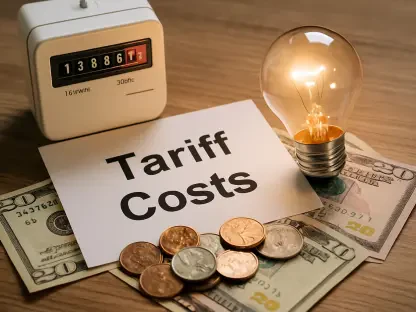In a stunning shift that has captured the attention of financial and tech circles alike, the Trump family has amassed a staggering $1.3 billion in cryptocurrency wealth, marking a bold departure from their traditional roots in real estate and political spheres. This transformation into the digital asset space is not merely a diversification tactic but a redefinition of their legacy, as they pivot toward blockchain technology with ambitious plans to revolutionize property investment. By leveraging their iconic brand and deep industry experience, the family is positioning itself at the forefront of a financial frontier that could reshape how assets are owned and traded. This move reflects a broader trend of established players embracing digital innovation, raising questions about the future of traditional industries in an increasingly virtual world.
Venturing into the Digital Asset Arena
Pioneering Crypto Projects and Wealth Accumulation
The Trump family’s foray into cryptocurrency has been nothing short of meteoric, with their wealth in digital assets now totaling over $1.3 billion through strategic initiatives. Two flagship projects, World Liberty Financial (WLFI) and American Bitcoin Corp. (ABTC), have propelled this growth, showcasing a calculated approach to harnessing blockchain’s potential. WLFI, a digital asset management venture, burst onto the scene with a massive market capitalization, generating significant paper wealth for key family members like Donald Trump Jr., Eric Trump, and Barron Trump. Meanwhile, ABTC, under Eric Trump’s leadership, has carved a niche in Bitcoin mining, with a public merger that boosted personal stakes to nearly a billion dollars. This rapid accumulation highlights a stark contrast to the slower pace of their real estate ventures, underscoring an aggressive push into uncharted territory.
Beyond the impressive figures, these projects signify a deeper intent to redefine financial engagement through technology. The scale of WLFI and ABTC demonstrates a willingness to adapt swiftly to market demands, leveraging the volatility and opportunity of crypto spaces. Unlike their historical focus on physical properties, this shift prioritizes virtual assets, aligning with a global surge in digital investment platforms. The family’s ability to translate their business acumen into this realm suggests a broader vision of integrating traditional expertise with cutting-edge tools. As they navigate regulatory and market challenges, their success in amassing such wealth points to a strategic foresight that could influence other legacy businesses eyeing similar transitions.
Scaling Operations with Strategic Partnerships
The operational expansion of WLFI and ABTC reflects a meticulous plan to solidify the Trump family’s foothold in cryptocurrency. WLFI is pursuing a $1.5 billion funding strategy through a Nasdaq-listed entity, ALT5 Sigma, aiming to establish itself as a dominant player in digital asset management. Token allocations for the family remain restricted to prevent premature sell-offs, a move that balances growth with stability. On the other hand, ABTC has prioritized infrastructure, utilizing equipment partnerships with firms like Hut 8 Corp to enhance mining capabilities. This focus on building a robust foundation has enabled a swift transition to a publicly listed status, showcasing adaptability in a fast-paced industry.
This scaling effort is not without its complexities, as the family navigates the speculative nature of digital markets. The restricted assets within WLFI introduce an element of uncertainty, yet also protect against sudden market disruptions. Meanwhile, ABTC’s emphasis on tangible infrastructure contrasts with the intangible nature of crypto wealth, providing a stabilizing factor. These strategic partnerships and operational decisions illustrate a dual approach of aggressive expansion and cautious risk management. As the family continues to build these enterprises, their ability to balance innovation with pragmatism will likely determine their long-term impact on the digital finance landscape.
Revolutionizing Real Estate through Blockchain
Tokenizing Property for a New Investment Era
A particularly groundbreaking aspect of the Trump family’s crypto journey is their plan to tokenize real estate, merging their storied expertise in property with blockchain technology. This initiative aims to allow investors to purchase fractional ownership of iconic holdings via digital tokens, potentially transforming how real estate transactions occur. Discussions with entities like Soul Ventures signal a deliberate effort to bridge physical assets with the digital realm, aligning with a broader industry trend of decentralization. Properties historically tied to the Trump brand, such as Trump Tower, could become accessible to a wider investor base through this model, democratizing access while maintaining the family’s legacy.
The implications of tokenization extend far beyond mere accessibility, as it could redefine the liquidity and transparency of real estate markets. By leveraging blockchain, transactions become immutable and verifiable, reducing fraud and intermediary costs. This approach not only modernizes the Trump portfolio but also positions them as pioneers in a niche yet growing sector of fintech. While challenges like regulatory frameworks and market acceptance remain, the potential to revolutionize a centuries-old industry is immense. If successful, this could set a precedent for other real estate giants to follow, further blurring the lines between tangible and digital wealth.
Redefining Legacy with Digital Innovation
The shift toward tokenized real estate and cryptocurrency signals a profound reimagining of the Trump family’s business identity, moving from physical landmarks to virtual dominance. Observers note that the value of their blockchain ventures already rivals that of their traditional holdings, indicating a pivot that prioritizes digital innovation over conventional assets. This transformation is viewed as one of their boldest moves, reflecting a desire to lead in a new financial era rather than merely adapt to it. The integration of real estate with blockchain is a natural extension of their brand, marrying historical strengths with futuristic possibilities.
This redefinition is not without risk, as the volatile nature of crypto markets introduces uncertainties absent in traditional real estate. Yet, the family’s calculated strategy—evident in the rapid success of WLFI and ABTC—demonstrates a readiness to embrace such challenges. Their ability to leverage name recognition and resources has positioned them as formidable players in a space far removed from their origins. As they navigate this transition, the focus on digital innovation marks a historic turning point, setting the stage for a legacy that could influence how industries evolve in the face of technological disruption. Looking ahead, exploring scalable tokenization models and fostering regulatory clarity will be crucial steps in cementing their impact.









